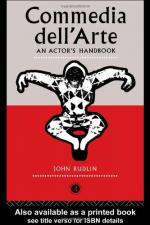|
This section contains 8,465 words (approx. 29 pages at 300 words per page) |

|
SOURCE: Firth, Felicity. “Comedy in Italy.” In Comic Drama: The European Heritage, edited by W. D. Howarth, pp. 63-80. London: Methuen, 1978.
In the following essay, Firth compares the literary comedy of Renaissance Italy with the popular commedia dell'arte, suggesting that the latter is characterized by a strong focus on the skill of the actor.
In the fifth century bc Epicharmus of Syracuse, writing on Italian soil the earliest recorded comic pieces, made up a play about the currently fashionable philosophy of Heraclitus. All is flux, Heraclitus is said to have said, life is a continual becoming, nobody is the same man today as he was yesterday. In Epicharmus' play, a debtor refuses to pay his debts. ‘Why should I pay,’ he asks, ‘since yesterday when I contracted the debt I was one man, and today I am another?’ His creditor sets about him with a stick. When taken...
|
This section contains 8,465 words (approx. 29 pages at 300 words per page) |

|


